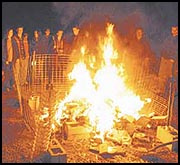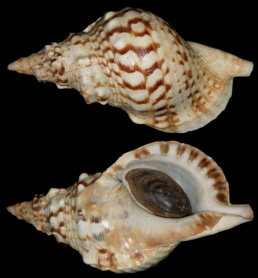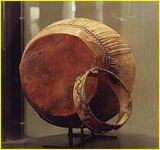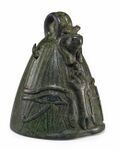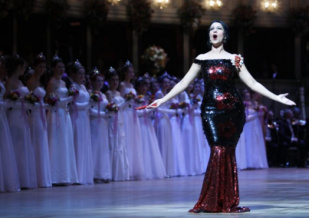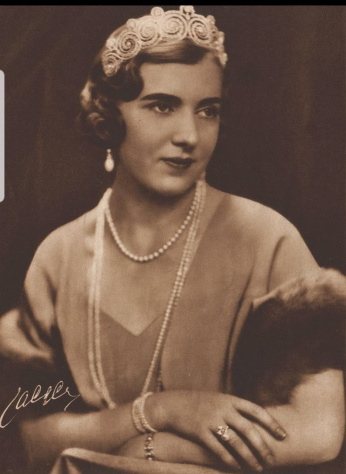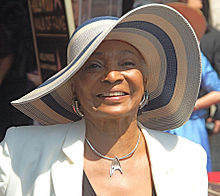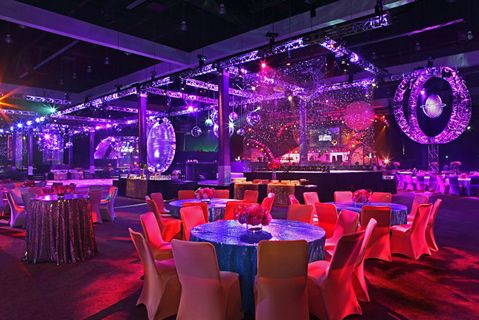West Phoenicia Music
The Empire of West Phoenicia is passionate about music and literature. Both have been a part of their culture since the country came into existence.
Jazz, Southern Gospel, Bubble-Gum Pop, Classic Rock and Country are popular music genres.
Opera is a favourite among the upper classes. West Phoenicia boasts some of the most opulent Opera houses.
Rap and Heavy metal is banned in the Holy city-state of Agape by orders of Pontifex Angelika I who has deemed it the Devils music.
Since 2010 numerous city-states have followed suit with many cities and towns undergoing yearly burnings of rap music and heavy metal rock that has been found especially amongst the youth.
There are 10,000 West Phoenician Radio Stations; it includes 2500 AM stations, 4,000 commercial FM stations and 1500 educational/non-profit FM stations
The Empire of West Phoenicia has entered their talented music artists in international competitions around the world such as the World Vision Song Contests and the World Hit Festivals.
West Phoenicia hosts a number of their own Awards Nights and Galas to reward and promote talent in West Phoenicia.
History
Archaeologists predate music being a form of entertainment in the region for well over 4000-year-old. Evidence discovered in Mermania cave artefacts, show couch shells as instruments and cave painting depicting music as a form of celebration.
As other ethnic groups migrated to the region other musical instruments were slowly introduced especially by the Babelite people.
The Babelite tribes introduced a host of musical instruments that were primarily used for wedding and funeral rites. Instruments such as drums, pan flutes, tambourines and bells became quite common at these events.
The priestly class used instruments such as the sistrum to communicate with the deities from pre-Greater Phoenicia times. a tradition that still exists to present day.
When the region unified under the Greater Phoenicia Empire in 1130 music continued to feature in wedding, funeral and religious rites.
In funeral rites, instruments such as tambourine and finger cymbals could be heard as women would perform the mourning lament.
At the Greater Phoenicia Empire royal court, visiting minstrels and bards were invited to perform. They introduced new music and instruments to the region. In return, Greater Phoenicians copied than produced their own music and instruments that they used to entertain the peasant masses and visiting dignitaries.
When West Phoenicia gained independence in 1586, they continued with the music that had influenced them. Artists and musicians also took the opportunity to create new musical influences.
The War of Greater Phoenicia Aggression (1592 to 1596) was a time of misery for all involved. However many citizens found solace in music.
General Naphtali Harrison and his wife Prudence was instrumental in the creation of Pro-West Phoenician patriotic songs. Freedom, West Phoenicia, Freedom, We won't Surrender and By the West Phoenician winds are three popular patriotic songs that are still sung by the modern-day West Phoenician military.
West Phoenicia is unique compared to many countries, the 53 city-states that make up the country each have their own cultural identity. Music, art, dance and costume play big parts in each city-state. Some styles have remained the same since the founding of the city-state, while others have progressed and changed with the times.
Folk music has played an important part in many city-states since 1586. Many oral traditions originally handed down, were transformed into songs.
Traditionally folk music was more of a working-class to peasant style of music but has since involved from the 1950 and has become popular among anti-war citizens and those seeking an alternative to commercial music.
The late 1600s saw many classical composers arise from West Phoenicia. These composers brought their own style to the West Phoenician social scenes of symphonies, concertos, and operas. Johann Von Dyke and Frederic Vagner are seen as two of West Phoenicia's greatest composers. Over 400 works are attributed to both of these men.
Country music also gained a foothold from the late 1700s, especially in the eastern and southern city-states where it became extremely popular and often competed again folk music in national competitions.
Bluegrass and Western evolved out of country and from the 60s when rock n roll became more grounded Rockabilly also rose to prominence which has seen Bluegrass shrink in popularity.
Country music has become a booming industry. All Hallows Territory, Fantasi, Lower West Phoenicia, Cluella, Polytheisa Heaven and Nova Texas are the city-states where Country has become a multi million dollar industry Neo Australis is home to Whiskey Records, the biggest music producing company in West Phoenicia. Emu Junction, the capital city is home to the Country and Western Museum. The infusion of country music into the country introduced new instruments such as the banjo, harmonica, mandolin and fiddle.
Since 2010 Country Rock has started to dominate the West Phoenician Country Music Charts. West Phoenicia Country Music Awards is held annually to acknowledge achiement in that industry.
Country Rock has introduced West Phoenicia and The world to artists such as Jacob Lei, Kei Davies, The Iron Ponies, Gabby Mountbatton, Lisa Adella, The New Wonders, Smokescreen 4 and Dustin McCloud
Lyres and harps, introduced by travelling minstrel during the Great Phoenicia Empire dominance were a favourite of the West Phoenician nobility classes.
The current royal family has a personal harpist among their paid servants as well as a Master of Music.
Wealthy citizens looking to emulate the royal family also hired harpists and pianists as members of their households to play during parties.
Classical and operatic music flourished in the nobility circles. In 1670 wealthy investor, countess and friend to Queen Bernice Bush III; Diana Towers; 1st Countess of Tennessee Meadow used her own money to build the first opera house in West Phoenicia.
The building took two years to complete but it stood like a dazzling jewel in the city By this time Queen Bernice Bush III had died from complications of a previous birth. To honour her friend the Opera house was named in her honour. The opera house was popular among the aristocracy, who filled the house every Saturday night to listen to international and eventually national singers.
West Phoenicia is now home to 20 opera houses, where the style of music is still extremely popular.
Jade Westwood is one of the most popular Opera stars. Madame Sofia Le'Oranga is considered one of her strongest competitors for soprano opera roles. Goldie Strauss, is regarded as one of the best mezzo-soprano singers before she retired to open her own school to train up the next generation of opera singers. Josef Puglia, is a leading bass-baritone. West Phoenician tenors consist of Mario Del Mont, Josef Zimmler and Jann Bavaria
As a God-fearing country, soul and gospel appeared throughout West Phoenicia as early as the 1700s. Each denomination had its own version of gospel, that like the pagans they used to praise God. Churches traditional started out with hymns, and as time went on both Catholic and Protestant denominations included soul and gospel sung by their choirs.
In 1900 when Christian denominations merged to form the True Path faith new music styles were introduced. During the 1970s Christian rock began to take hold along with full church bands and choirs.
Those denominations that chose not to merge, continued on the more traditional route of music.
During the 18th to 20th century, an influx of new immigrants continued to bring new styles of music. Their arrival, blended with past trends saw the growth of Jazz, Rhythm and blues, disco, rock and pop, which began to dominate the airwaves, supper clubs and concert halls.
World War I and II resurrected the patriotic and nationalist music for the citizens of West Phoenicia. Songs to uplift the nation and boost the morale of West Phoenician military and their allies took centre stage. Songs during this time consisted of, a lover waiting faithfully for the war to end, loud and brass songs of victory, and songs promoting peace to prevail. Elaine Stephens, Black Foot Brothers, Thomas McVeigh, The War Babies, Judy Young and Victory Rose were popular musicians during World War II.
West Phoenicia Entertainment Corp was created, that saw musicians, artists, dancers and comedians sign up to volunteer to entertain the allies during both wars to help boost morale.
During both world wars, the West Phoenician government used music as a form of propaganda. The uplifting songs helped to boast West Phoenician morale. Policies were implemented to use propaganda music to demoralise the enemy.
West Phoenician propagandists during World War I consisted of Lord and Lady Von Kaiser and Dieter the Defector. Both would play Central Power songs than make derogatory comments as they played superior West Phoenician music. They claimed they were defectors who denounced the war and policies of the Central Powers and called on enemy citizens to rise up against their governments. Intelligence agencies used the radio hosts to devulge enemy secrets that were discovered, as well as make claims to confuse the enemies.
During World War II, West Phoenicia returned to using radio hosts to send out propaganda in the form of music and interviews to boost the morale of Allied troops while bringing down their enemies.Victory Victoria, Col.Stronghold, Axis Andrew, Patriotic Pandora and Lullabye. Victory Victoria would sing songs in German, as well as mentioning false information of upcoming bombing raids to confuse the enemy. She would also send messages to soldiers from loved ones back home. Patriotic Pandora main targets were The Kingdom of Rhodes and Greater Phoenicia Empire, she would often parody enemy nations songs and urged citizens of those nations to turn on their oppressors. She would sign off with 'West Phoenicia is your friend. Your government is the enemy' while she played the national anthems from those nations.
Queen Consort Eurydice Bush as Queen than Queen mother played a big part in assisting in boosting morale. Three times a week she hosted a 30-minute radio program, praising the West Phoenician and Allied troops while patriotic music played in the background. She also spent time denouncing the Axis and their allies inhumane policies. She called on citizens to support the resistance in occupied countries and praised the allies in their work. She would also give an account of Jews and other people destined for Concentration and death camps who were rescued and now living in West Phoenicia. Before signing off she would sing the West Phoenician National anthem. After the war, Queen Consort Eurydice Bush was awarded the medal of peace for all the hard work she took part in.
The establishment of Jazz and Rhythm and blues clubs popped up in a number of city-states capital cities post World War II and continued to grow through the decades. The Sinn-Ammon Club, Orange Marmalade House and Meow Club are three popular jazz houses that operate in Melbourne-Haven. Hundreds of acts and jazz performers were discovered by music industry producers in these clubs. Herbie Flaw, Geraldine Harris, Louie Costello, Jason Young, and Canary Sinclar were popular jazz performers who started their careers in these jazz clubs. One of the most popular headliners was Octavia Cross hailed as Queen of West Phoenician jazz.
The 1950s saw the explosion of doo-wop, pop and rock n roll and their sub-genres across the country, initially from international artists but national artists soon emerged with their own style.
The younger generations wanting to break free with their own freedoms of expression and creativity burst onto the West Phoenician music scene. The music and lyrics were very important in the changing political and social views. War was over and it was time for happiness to reign.
The new music was appealing, vocals became more upbeat, catchy and free from any set formula. West Phoenician audiences were often in hysterics when their favourite performers were onstage.
The new wave of music was not just restricted to vocals; new instruments like the electric guitar was introduced that gave the music a whole new beat intertwined with a whole new culture of attire.
Popular music artists during the 60s to the 80s comprised of male artist like Mozart Tunis, Red Baron II, Frank Lewis-Cabot, Marc Dellahunt, Carson Whyte, Teddy Franks Ethan Amun Donatello Pitney, Jimmy Black and Bobby Perry.
One of the most popular male artists was Mike Hu who sold over a million records in 1963 with his classic hit, 'Kiss me in the rain.'
Female Solo artists included; Paulette Sands, Alice Wonders, Daisy Addams, Mary-Lou McGowan, Cassandra Daly, Jayne Valley,Marilyn DuPree, Helena Floss, Gillian Clark and Barbara Dundas
Popular groups comprised of; The Strawberry Cupcakes, The Whyte Crows, The Aqua Raindrops, Gracie and the Bubbles, Teddy and the Toys, The Jaguars The Spotted Zebras, The Sugar Cookies, Jack and Jill Bucket,
As West Phoenicia moved into the 80s and 90s, the soft rock and pop from the 60s transformed to harder rock, bubble gum pop, dance, garage rock and new wave.
1960s to modern day, saw Lounge Singers become extremely popular in West Phoenician hotels, clubs and casinos. The easy listening tunes accompanied by a piano or guitar in a relaxed environment, became a hit with the middle and upper classes. Maralena Devine is one of the top lounge singers well known for her torch ballads. Maraleba sings in the lounges of high class casinos. She has had a number of songs appear on the West Phoenician Music charts. Other notable lounge singers who have made a name for themselves include Austin Weston, Frank Algotta, Kerri Moa, Lady Flamingo, Shivandra K, Trisha Beech and the Gospela Family
Disco has never died in West Phoenicia, since the 1970s when disco was introduced to the country. It has just involved over time. Discos while not as popular as night clubs are still prevalent around the nation. Over 40s tend to prefer the traditional disco scene while the under 30s favour nu-disco. The Four on the floor beats, glittery disco balls, lighted dance floors and up tempo sounds fit in well with the expensive, extravagant and slinky disco wear. Most major cities have at least one or two disco venues. The three most popular discos in the nation are; Garden of Eden, located in the capital city of the city-state of East Eden. Babylonia 2000 located in the city-state of Bourbon-Versailles and Funky Kitty located in Jackson, West Phoenicia are three of the busiest discos. Conservative groups have often criticised these discos for their hedonistic atmosphere where drugs are a common sight as well as promiscuity. The most popular discos musical artists of the 70s and 80s included; Lady Hawke, Rory Thomas, Peppermint 4, Christian Gerr, The Tutti-Fruttis and Laura Lovely.
Galatika and Hans Zeal are two popular nu-disco artists who currently top the West Phoenician dance charts with their revival of nu-disco.
After the 5th West Phoenician civil war ended in 2010, a lot of the culture that was suppressed under Queen Jezebel Bush was lifted.
Electronic dance music, house music, trance,dance-pop and nu-disco have all emerged onto the West Phoenician night club scene, it is extremely popular among the youth and early twenties to thirties crowds.
Since 2013 Pontifex Angelika I Deo Deuotus has attempted to get trance and similar music banned as a negative attribute to West Phoenician society, much like former Pontifex were able to ban rap and heavy metal.
In 2017 night club owners and festival promoters showed the government how profitable these dance genres are. While electronic dance music remains popular, the Pontifex was able to get it banned in the city-state of Agape, and also was able to implement a law to shut down any venue where drugs were found on premises during dance parties and raves and a $500,000 fine to owners. Due to this law, night clubs have creates strict search policies to ensure drugs are not found on-premises.
Award Shows
West Phoenicia hosts a number of Music award shows to reward the talents of its artists, they include;
- West Phoenicia Country Music Awards
- West Phoenicia Pop Awards
- Silver Cloud Opera Awards
- Music for the Soul Awards
- Indie Music Awards
- West Phoenicia Rock n Roll Awards
- The Siren Awards
- Goddess Meret Annual Music Festival
Contests
Over the years West Phoenicia has entered a number of International Music Contests.
World vision Song Contest and World Hits Festival are the two more popular contests West Phoenicia has entered.
World Vision Song Contests
WorldVision Song Contest #49
The Worldvision Song Contest #49th edition was held in Electrum. The Laxettes won the nomination to sing at this prestigious music event in the debut entry for West Phoenicia. The girl group sung their original song "Please Don't Take my Cigarettes" Out of 28 nations. The Laxettes finished in 26th place.
WorldVision Song Contest #50
The Empire of West Phoenicia officially entered the WorldVision Song Contest #50, that was held in Kaisen, Kalosia. Aquarius won the nomination to sing at the competition with their song Segregation:( Give me a reason to love you) Aquarius placed 27th out of 31 entries.
World Hit Festivals
World Hit Festival #26
West Phoenician male solo artist Hero registered for the 26th edition of the World Hit Festival when he won the national competition to represent West Phoenicia. World Hit Festival #26 was held in Monterra, Kalosia where he sung the song Fame or Me? West Phoenicia finished with a final rank of 7 out of 9.
World Hit Festival #27
West Phoenician Lady Gaia won selection to represent the nation in the 27th Edition of The World Hit Festival. The competiton took place in Kyvivre, Britonisea. Lady Gaia sung a beautiful folk song; Beloved Mother Earth. West Phoenicia finished with a placing of 12th.
World Hit Festival #28
West Phoenician popular girl group Bubblegum was choosen to represent the nation at the World Hit Festival #28, which was held in Vodiznad, Izmedu. The song they entered for the competition was Bubblegum Kisses. The results were dismal, placing 2nd last and forcing West Phoenicia to pull out of future competition due to accusations of vote rigging and favoritism.
West Phoenician musicians
West Phoenicia has an abundance of music talent across the Empire. Some well known musical artists include;
| Music Artist | Genre | City-State Origin |
|---|---|---|
| Holly Fartoni | Country | New Dixie |
| The Insects | 4 man rock n roll | New Tudor |
| Dixie Goodrem | Pop | Jackson |
| Jade Westwood | Opera | Upper West Phoenicia |
| Hero | Pop & Ballads | Jackson |
| Gene Campbell | Country and Western | Upper West Phoenicia |
| Magdalene | Pop | Olympia Hills |
| The Laxettes | Doo Wop & Pop | Fort Blackfoot |
| Aquarius | Pop | Lower West Phoenicia |
| Lady Gaia | Folk | Africana Territory |
| The Westexx Trio | Folk | St Mary's |
| Blaine Daniels | Folk | Nova Texas |
| 4 Privates | Pop, R&B, Patriot Ballads | Jackson |
| Bubblegum | Pop | Neo Australis |
| The Gidgettes | Surfer Rock & Pop | Deception Bay |
| Duncan Whitehall | Pop Rock, Swing, Jazz | Nova Texas |
| The Watermelons | Kids musical group, Pop | Upper West Phoenicia |
| The Rainbow Teddybears | Kids musical group, Pop | Jackson |
| Maralena Devine | Lounge Singer, Ballads, Jazz | Brigham Territory |
| Josef Puglia | Opera | New Tudor |
| Madame Sofia Le'Oranga | Opera | East Eden |
West Phoenician Music Deities
The West Phoenician Pantheon of deities can be quite extensive. The nation has a large percentage of citizens who follow the polytheist pantheon, paying homage to a variety of gods, goddesses and animal deities who overlook their daily life.
Music deities are no exception, from the prehistoric times in the region, the priestly class has seen music as a form of communication with the deities. They also pay thanks to those deities who inspired music to flourish in the region.
Pan
Pan is one of the earliest music deities found in West Phoenician folklore. His origin is traced back to Greek colonies that popped up in pre-West Phoenician times. Pan is responsible for rustic music and nature. Musician often say a prayer to Pan before a performance to receive his blessing.
Euterpe
Euterpe is a Greek muse of lyric poetry. She was introduced to the region by travelling ministels, bards and poets who were invited to perform in the royal court of the Imperium royal family in Greater Phoenicia in 1145 during the reign of Queen Delphina Imperium
Queen Dephina Imperium incorporated the muse as a minor goddess in the pantheon as part of a Greco-Phoenician syncretism Euterpe was given authority over wind instruments, lyrical music and poetry.
Statues of Euterpe are a common sight in outdoor music establishments and concerts. The Imperial palace in Melbourne-Haven, has a garden of Euterpe to honour the goddess. The garden has featured in a number of royal weddings and galas.

